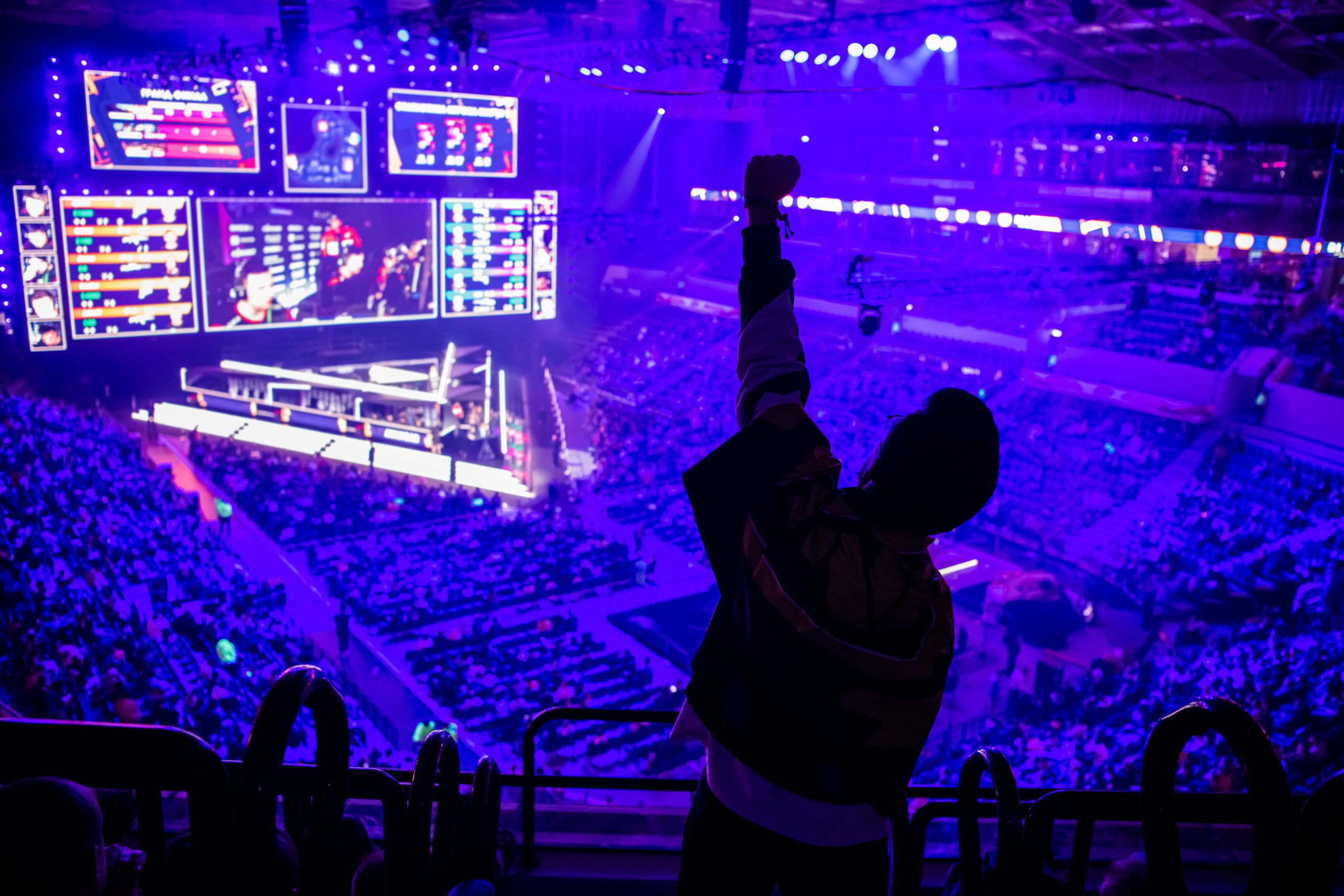Lately, the growth of esports has cemented itself as an industry that looks really promising. Newzoo, one of the leading esports and gaming market research companies, predicts that esports will become an industry worth US$ 1.1 billion by 2020. Seeing this, it is not surprising that many people decide to venture into the esports business. In addition, the pandemic situation also boosted the popularity of gaming as everyone spends most of their time in their homes, and outdoor activities are prohibited.
However, we should realize that esports is considered a vertical development of the gaming industry. Although esports is predicted to become an enormous industry, not all gamers follow, understand, or have full knowledge about esports. Therefore, it begs to ask the following questions: why do people watch esports? And if the industry is expected to be incredibly successful, what makes esports so interesting for its many followers? Finally, how effective is esports at becoming a marketing tool for developers?
A Brief Discussion on the History of Using Esports Tournaments as a Means of Marketing
Before going to the main discussion, let’s take a step back in time to see the history of competitions in the realm of video games. Even though the esports scene may look very new or young, video game competition is a phenomenon that has been happening since the 1990s. If you want to know more, you can read the following articles discussing the history of esports on the international scale or the history of the development of Counter-Strike esports in Indonesia.
One aspect that distinguishes between today’s esports and the video game competitions in the ’90s is the purpose behind creating those competitions. Back then, video game competitions were held as a marketing tool for game developers and publishers. If you want to know this history from a western cultural perspective, I would advise you to watch the riveting Netflix documentary, High Score.
(Spoiler alert!) The documentary introduces the video game competition ecosystem in the 1990s USA. It started off with Nintendo, a game console company, creating a tournament called the Nintendo World Championship in the United States. Several years later, SEGA, another Japanese game console company, soon followed and created the SEGA World Championship.
Just a few years later, the video gaming competitions have matured into the full-fledged esports scene we see today. However, the essence and purpose of esports as a video game competition has not changed. But, slowly and surely, esports is experiencing a shift in its function. It developed from a simple marketing tool to an independent industry that will change gaming forever. We can see this from Riot Games, which makes esports a pillar of their business.
With these changes, esports is no longer tied to the monopoly of game developers. Today, many parties continue to cultivate the competitive side of gaming so that the esports industry can survive and keep developing. Therefore, in an effort to reach this goal, we must investigate the reasons behind why people watch esports.
Furthermore, what are the answers to the questions mentioned previously? Can esports still be an effective marketing tool? To answer this, let’s move to the next discussion.
Reasons Why People Watch Esports
To tackle this topic, we need to take a look at a scientific journal titled Does esports spectating influence game consumption (Tyrväinen, Pirkkalainen, and Hamari 2020). As the title suggests, the journal will give us insights into the correlation between watching esports and the consumption of video games.
More specifically, the journal tries to find out the relationship between the level of esports consumption and the level of in-game content purchases, as well as the relationship between the level of video game consumption and the level of in-game content purchases. Lastly, the journal also discusses the possible reasons why people watch esports.
The scientific journal mentions 9 possible reasons why people consume esports content. These factors were adapted from a theory called the Motivation Scale for Sport Consumption, often used in traditional sports.
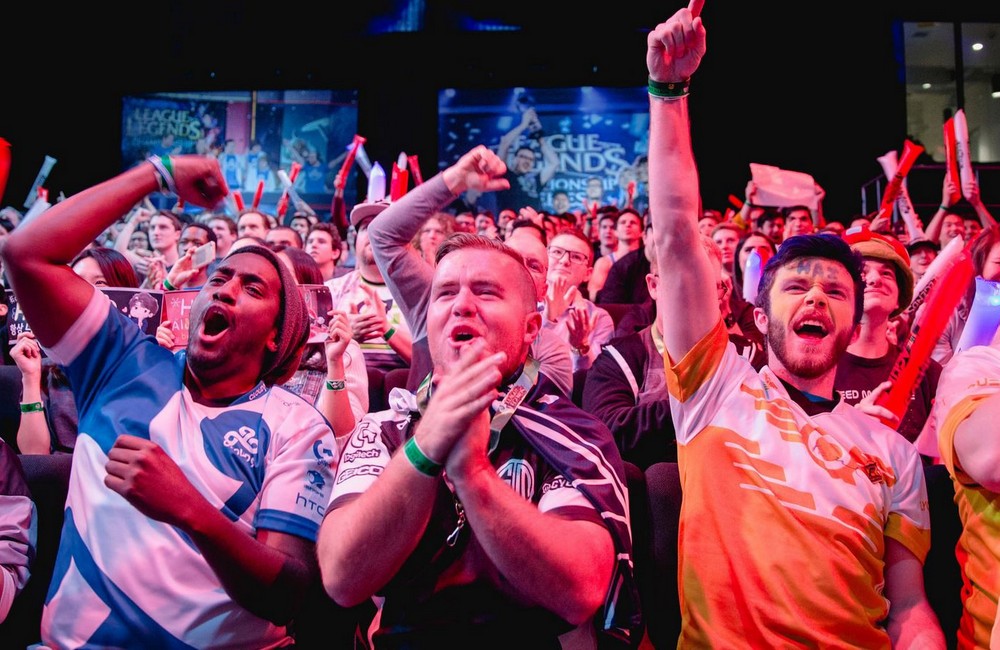
The first possible reason why people watch esports is to witness the highlights and achievements of our favorite team. The second reason is the acquisition of knowledge or our desire to gain information, techniques, and tips from the professional. Another reason is the aesthetic appreciation of the nuances and artistry of a competition.
The fourth reason is witnessing the drama occurring in the dynamic stories and relationships between professionals. People also use esports as an escape or a method to unwind from their routines. Friends and family can also influence someone to follow and watch esports. The study also found a positive association between physical attraction, or the admiration of professionals’ skills, and the desire to watch esports. Spectating and studying pro players’ skills can also be an incentive for many who watch esports. Lastly, people watch esports to benefit their social interactions as it can be an easy way to connect with other like-minded esports spectators.
The research used 222 respondents who were F2P game players. These players are gathered through social media and online forums. The research has succeeded in finding several correlations or positive associations from the indicators used. It found that watching esports is correlated with the desire to play the spectated game. However, the research has failed to find the association between watching esports and the desire to buy digital content from the games you watch. On the other hand, players with a drive to play games are most likely to purchase the games they desire.
Therefore, the research is relatively successful in answering our question at the beginning of the article. Undoubtedly, esports is still quite effective when used as a marketing tool. However, we know that purchasing digital content is not necessarily correlated with esports but rather the intensity or desire for playing games. Therefore, some tweaking will be needed for esports to have an impact on the sales of digital goods in-game (or in-app purchases).
So what makes someone watch esports? The research only found 3 of the 9 factors to have positive associations with esports watching intention. The three factors are the acquisition of knowledge, family and friends, and escape.
As mentioned previously, the acquisition of knowledge means that the audience watches esports to gain some knowledge or information about the game from the professionals. We can then use this newfound knowledge as our new in-game repertoire or share it with our friends.
In terms of the factor of family and friends, the research found that watching esports can be used as a method to strengthen social relationships. This finding is quite interesting because watching esports has either no or negative effects on social interactions, as many people claim. However, the research implies that one of the goals behind watching esports is strengthening existing relationships with people you know (family/friends) rather than making new relationships with new people. The last factor, escape, proposes that watch esports to relax from their daily routine fatigue.
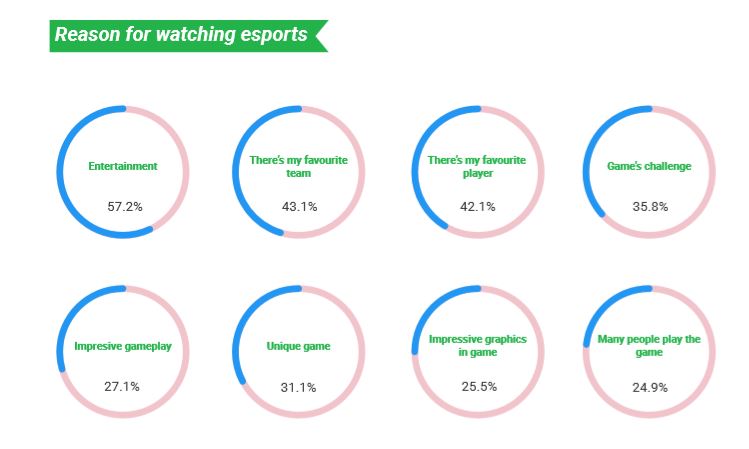
As we have seen from the scientific journal, there are a variety of reasons why people watch esports. Hybrid.co.id together with Dailysocial.id also conducted research related to the 2019 Esports Market Trend 2019. From this research, we found that the 3 biggest reasons people watch esports are for entertainment, supporting their favorite team, or their favorite player. Of the 1,445 participants of the research, 57.2 percent watched esports as a means of entertainment, 43.1 percent admitted to watching esports to support their favorite team, and 42.1 percent watched esports to support their favorite players.
Battlefy, an esports platform based in Canada, also conducted similar research shown in the figure above. 89 percent of the 345 respondents, the largest percentile, claimed to watch esports because they want to improve their gameplay. The second-largest percentile of the correspondents, 83 percent, watch esports as a means to participate (play and compete) in the esports games they spectate. Lastly, as many as 58% of the total respondents admitted to watching esports because they like the surrounding culture and community.
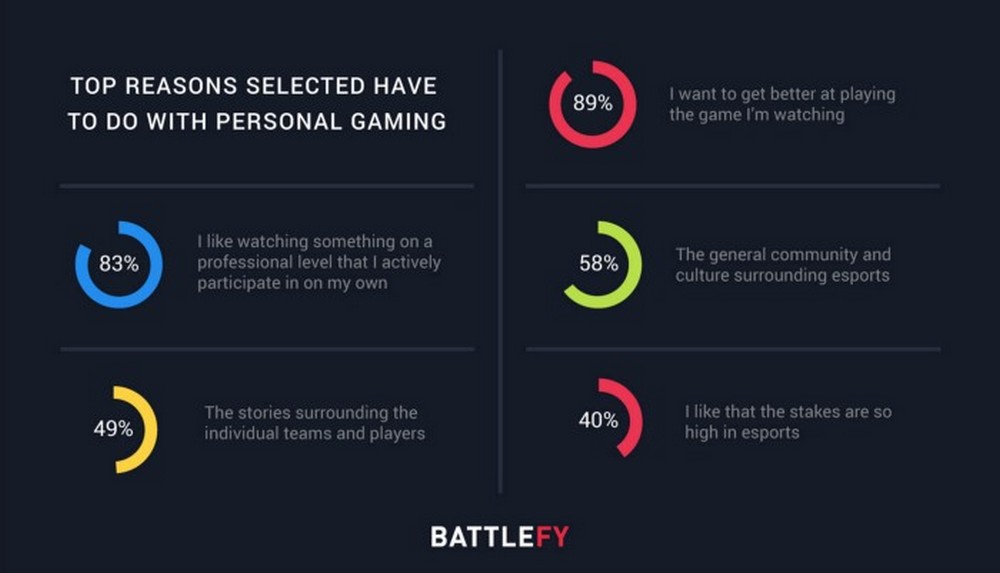
Observing the results above, the reasons people watch esports can be narrowed to three things. First, people watch esports to learn how the professionals play and apply it in their own gameplay. Secondly, people watch esports for leisure and entertainment. Thirdly, watching esports is used to improve social life and interactions
If you are an esports industry practitioner, these three reasons might be things that you ask yourself before planning to make an esports show. Are your esports shows entertaining? Can your esports show be used as a learning tool for other players? Do your esports broadcasts encourage social interactions between the spectators?
I cannot say with full confidence that accommodating these factors is the right recipe for creating a successful esports event. However, at the very least, it can be used as a general guideline to make your esports event much more entertaining for the viewers.
Personally, I feel that one of the factors above accurately described my reasoning for watching esports. Let’s take my example of watching Worlds 2020. Even though League of Legends is not very popular in Indonesia, I still followed the Worlds 2020 event a few months ago simply because some of my friends participate in the League of Legends scene. As part of the FOMO (Fear of Missing Out), I try my best to follow League events. Fortunately, watching Worlds 2020 also helped inspire my work to discuss why South Korean youth are so good at playing League of Legends.
The Impact of Watching Esports on Game Consumption
How about the relationship between watching esports and the level of game consumption? To answer this question, we need to observe another study and example, this time from the PUBG Mobile scene.
From the data of the most popular esports broadcast in August 2020, PUBG Mobile ranks first with a record of 1.1 million peak viewers. We also see that the number of PUBG Mobile game players continues to grow as Tencent continues to improve the competitive aspect of the game. Data shows that PUBG Mobile has been downloaded 400 million times with a daily active player count of 50 million people in June 2019.
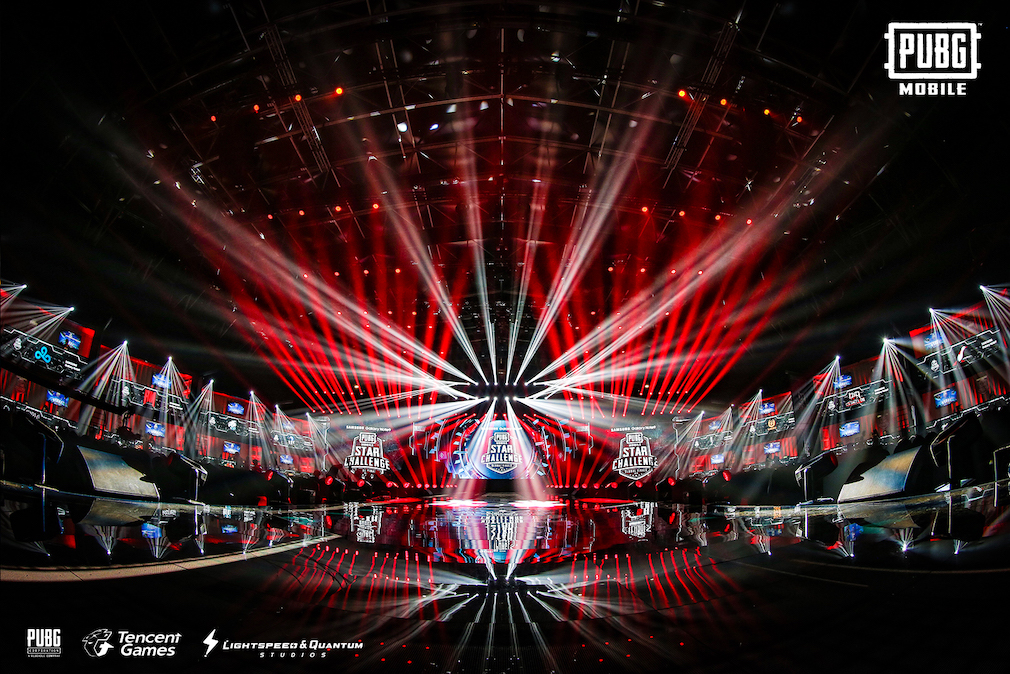
Of course, this figure alone cannot fully prove that esports broadcasts will attract new players. In fact, it could be argued that most PUBG Mobile esports viewers already played the game beforehand. But even with this argument, esports events can, at the very least, help the game developers keep their player base entertained.
Let’s now try to figure out the correlation of watching esports with the consumption of digital goods in games. Data from research has actually shown that there is indeed a positive association between the two subjects. Returning to PUBG Mobile as an example, we can see how the game has earned over US$3 billion after its 2-year run. Esports may not have an immediate impact on the sales, but it definitely has played a significant role in keeping it popular for years.
As we have seen from the studies previously, there are countless factors that incentivize someone to play games and buy in-game purchases. It is not easy to say how big of a role esports plays in this matter. On the one hand, we can see Ubisoft’s success Rainbow Six: Siege more attractive to players because of esports. But on the other hand, Mihoyo is able to successfully earn US$ 100 million through Genshin Impact without taking any initiatives on esports.
The genre of the game could be yet another additional variable that potentially complicates this discussion even further. In the end, I think it is safe to say that esports can create many opportunities in this modern era. Thanks to the massive technological advancements in the past few years, esports is no longer just a marketing tool but also an independent industry with a lot of potential and room to grow.

